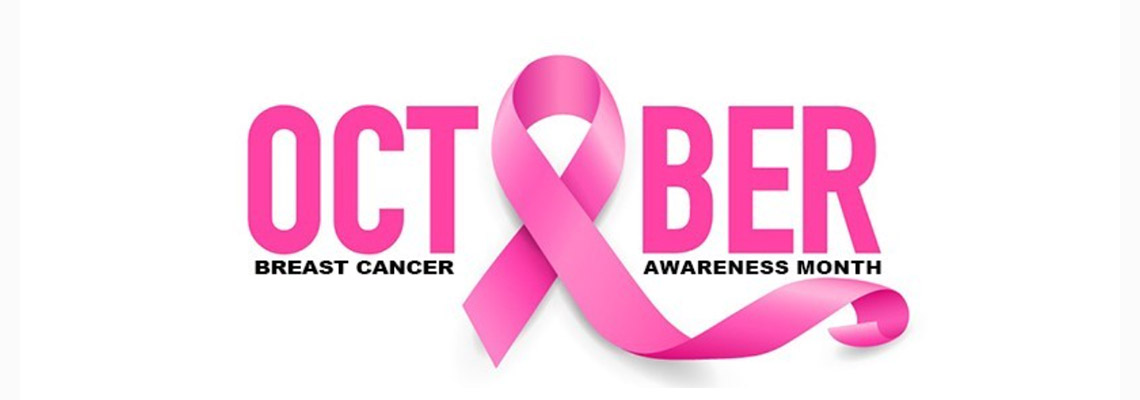
October 19, 2023
Borough of Manhattan Community College (BMCC/CUNY) recognizes Breast Cancer Awareness Month 2023 this month with an information display, self-breast exam workshop, breast cancer prevention and treatment webinar and more.
The American Cancer Society estimates there will be almost 300,000 cases of invasive breast cancer diagnosed in women and 2,800 for men in the United States in 2023. In addition, there will be an estimated 43,700 deaths from breast cancer.
Drilling deeper into those statistics reveals other reasons why breast cancer awareness is critical at BMCC, with its enrollment of more than 17,000 students—almost 70% of whom are Hispanic or Black, and almost 60% who are women.
Fostering a culture of awareness is key

“This particular cancer is most diagnosed in women in the United States, and the leading cause of death among Blacks and Hispanic women,” says Health Education Professor Hardaye Sharie R. Hansen, referring to an article in the American Cancer Society journal “CA: A Cancer Journal for Clinicians.”
“This month of Breast Cancer Awareness is to educate the nation for early detection, prevention, treatment and access to quality health care,” she adds. “CUNY campuses engage in breast health fairs, counseling and mindfulness practices available for individuals with breast cancer challenges. Additionally, self-exams, mammography and understanding one’s genetic predisposition for breast cancer is pivotal.”
Breast cancer risks, she says, include factors such as alcohol consumption, smoking, obesity or participation in hormone replacement therapy.
“However, an individual can develop breast cancer without having any risk factors,” she clarifies. “Having a risk factor does not mean an individual will get the disease, nor do all risk factors have the same effect.”
She also emphasizes that an individual’s risk for breast cancer is higher if the disease is genetic, “however, even if there is no genetic factor present, it is imperative to seek regular medical checkup annually.”
A comprehensive approach that includes education, breast cancer treatment and ongoing monitoring “ensures the best possible outcomes for faculty, staff and students in the prevention of this disease and those affected by breast cancer,” she says. “Distribution of knowledge, encouragement and fostering a culture of awareness will empower overall public health cognizance and ultimately save lives.”
Research reveals risk factors — and nutrition is one strategy to mitigate those risks

Health Education Professor and Deputy Chairperson sheds light on the science behind risk factors related to breast cancer that Professor Hansen brings up, and references a May 2023 article in The Harvard Gazette.
“Quite simply,” she says, “excess estrogen is the culprit. Research studies reveal high levels of estrogen to be associated with increased risk of breast cancer.”
She goes on to break down the connection between estrogen levels and body weight.
“First, fat cells (adipose tissue) produce excess amounts of estrogen, so higher overweight BMIs increase one’s breast cancer risk,” she says.
“Further, menstruating at a young age exposes one early to estrogen production. Experiencing menopause later, exposes one to estrogen production longer. And if one opts for estrogen hormone replacement therapy, then one prolongs exposure to estrogen.”
She further explains that the hormone estrogen stimulates cell growth in the breasts, “and the more rapidly cells grow and divide, the more likely something can go wrong, mutate and lead to abnormal cancer cells.”
Another consideration, she says, is that obesity is associated with long-term inflammation, “which the body treats as an illness and attempts to repair through again more cell growth and the accompanying risks.”
Professor McNamara also outlines scenarios that can impact risk factors for breast cancer.
“If one maintains a healthy pre-teen weight, one is less likely to experience early menstruation.,” she says. “If one maintains an ideal body weight as an adult, they can possibly avoid nonessential inflammation.”
She adds that people who breastfeed produce less estrogen as the body focuses on increasing other necessary lactating hormones, “and in the case of multiple pregnancies, the number of lifetime menstrual cycles is reduced, which offers a protective effect against breast cancer.”
Finally, she says, “from a nutritional perspective, it is recommended that individuals maintain a diet that is balanced in calories as well as nutrients; this can be achieved by including all the food groups and using appropriate portion sizes. For mothers, breastfeeding supplies a healthy diet tailored to the baby and can help one return to their pre-pregnancy weight faster and help manage estrogen levels.”
Learn more about breast cancer, mammograms and staying healthy
Learn more about breast cancer by participating in Breast Cancer Awareness Month at BMCC.
Mammograms are the key to early breast cancer detection. For more information on where to get a mammogram, visit here.
For more information on breast cancer rates, risks and more, visit the New York State Department of Health, the National Cancer Institute, or the American Cancer Society at (800) 422-6237.
Health education saves lives. For more information on the BMCC Health Education Department, which is chaired by Dr. Lesley Rennis and offers associate degree programs in Community Health Education, Gerontology, School Health Education, and Public Health, visit here or call (212) 220-1453.
STORY HIGHLIGHTS
-
BMCC recognizes Breast Cancer Awareness Month 2023 this month with an information display, self-breast exam workshop, breast cancer prevention and treatment webinar, and more
-
Breast cancer is most diagnosed in women in the U.S., and the leading cause of death among Blacks and Hispanic women, says Health Education Professor Hardaye Sharie R. Hansen
-
Research studies reveal high levels of estrogen to be associated with increased risk of breast cancer, says Health Education Professor and Deputy Chairperson Gloria Shine McNamara, who shares strategies to mitigate that risk

